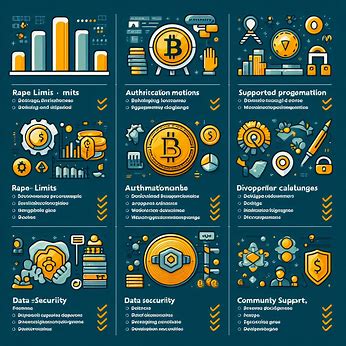Are you a developer looking to build the next big crypto app? You’ll need a reliable exchange with a powerful API. Here are cryptocurrency exchanges with the best APIs for developers.
1. Coinbase Pro
Coinbase Pro is the advanced trading platform of Coinbase; it provides a special API for developers. The exchange offers a well-documented REST API and WebSocket feed, enabling real-time data streaming and programmatic trading. With support for multiple order types and a wide range of cryptocurrencies, Coinbase Pro is a top choice for developers.
Key features of the Coinbase Pro API:
- RESTful API for trading, market data, and account management
- WebSocket feed for real-time updates
- Extensive documentation and code examples
- Libraries are available in various programming languages.
- Sandbox environment for testing.
2. Binance
Binance, one of the world’s largest cryptocurrency exchanges, offers a feature-rich API for developers. The Binance API supports a wide range of endpoints, including market data, trading, and account management. With its high performance and reliability, the Binance API is widely used by developers for building trading bots and other crypto-related applications.
Key features of the Binance API:
- RESTful API and WebSocket streams
- Support for spot trading, margin trading, and futures
- Detailed documentation and code examples
- SDKs are available in multiple programming languages.
- Testnet environment for testing
3. Kraken
Kraken is a well-established cryptocurrency exchange known for its security and advanced trading features. The Kraken API offers a set of endpoints for trading, market data, and account management. With its reliability and fast performance, the Kraken API is a choice among developers building professional trading applications.
Key features of the Kraken API:
- RESTful API for trading and account management
- WebSocket API for real-time market data
- Detailed API documentation and guides
- Client libraries are available in various programming languages.
- Demo environment for testing.
4. Bitfinex
Bitfinex is a leading cryptocurrency exchange that provides a powerful API for developers. The Bitfinex API offers a wide range of features, including trading, margin funding, and market data. With its low latency and high throughput, the Bitfinex API is suitable for building high-frequency trading applications and other demanding projects.
Related: What is Zcash (ZEC) and How Does It Work?
Key features of the Bitfinex API:
- RESTful API and WebSocket interface
- Support for margin trading and funding
- Detailed API documentation and code examples
- Client libraries are available in multiple programming languages.
- Sandbox environment for testing
5. Huobi Global
Huobi Global is a prominent cryptocurrency exchange that offers a feature-rich API for developers. The Huobi API supports a wide range of functionalities, including spot trading, margin trading, and futures trading. With its high-performance infrastructure and extensive documentation, the Huobi API is a reliable choice for building advanced trading applications.
Key features of the Huobi API:
- RESTful API and WebSocket streams
- Support for spot, margin, and futures trading
- Comprehensive API documentation and guides
- SDKs are available in various programming languages.
- Testnet environment for testing
6. OKX (formerly OKEx)
OKX, formerly known as OKEx, is a leading cryptocurrency exchange that provides a better API for developers. The OKX API offers a wide range of features, including spot trading, margin trading, futures, and options. With its high-performance and reliable infrastructure, the OKX API is suitable for building professional trading applications and other crypto-related projects.
Key features of the OKX API:
- RESTful API and WebSocket streams
- Support for spot, margin, futures, and options trading
- Detailed API documentation and guides
- SDKs are available in multiple programming languages.
- Testnet environment for testing
7. FTX
FTX is a fast-growing cryptocurrency exchange that offers a powerful API for developers. The FTX API provides a wide range of features, including spot trading, futures, and used tokens. With its low latency and high-speed execution, the FTX API is well-suited for building high-frequency trading applications and other demanding projects.
Key features of the FTX API:
- RESTful API and WebSocket interface
- Support for spot, futures, and leveraged token trading
- Comprehensive API documentation and guides
- Client libraries are available in various programming languages.
- Testnet environment for testing
8. Bitstamp
Bitstamp is one of the oldest and most trusted cryptocurrency exchanges, offering a reliable API for developers. The Bitstamp API provides a better interface for trading, market data, and account management. Key features of the Bitstamp API:
- RESTful API for trading and account management
- WebSocket API for real-time market data
- Clear and concise API documentation
- Client libraries are available in multiple programming languages.
- Demo environment for testing
9. Gemini
Gemini is a regulated cryptocurrency exchange known for its focus on security and compliance. The Gemini API provides a secure and reliable interface for trading, market data, and account management. With its adherence to strict regulatory standards, the Gemini API is an excellent choice for developers building institutional-grade crypto applications.
Key features of the Gemini API:
- RESTful API for trading and account management
- WebSocket API for real-time market data
- Comprehensive API documentation and guides
- Client libraries are available in various programming languages.
- Sandbox environment for testing
10. KuCoin
KuCoin is a popular cryptocurrency exchange that offers a feature-rich API for developers. The KuCoin API supports a wide range of functionalities, including spot trading, margin trading, and futures trading. With its user-friendly documentation and dedicated support, the KuCoin API is a great option for developers of all skill levels.
Key features of the KuCoin API:
- RESTful API and WebSocket streams
- Support for spot, margin, and futures trading
- Detailed API documentation and guides
- SDKs are available in multiple programming languages.
- Sandbox environment for testing
Key Takeaways
1. The top 10 cryptocurrency exchanges with the best APIs for developers are Coinbase Pro, Binance, Kraken, Bitfinex, Huobi Global, OKX, FTX, Bitstamp, Gemini, and KuCoin.
2. These exchanges offer robust APIs with features like RESTful endpoints, WebSocket streams, and support for various trading types, including spot, margin, futures, and options trading.
3. The APIs provide comprehensive documentation, code examples, and client libraries in multiple programming languages, making it easier for developers to integrate them into their projects.
4. Many of these exchanges offer testnet or sandbox environments, allowing developers to test their applications without risking real funds.
5. When choosing an exchange API, developers should consider factors such as performance, reliability, security, and the specific features that align with their project requirements.
6. Before starting development, it’s essential to thoroughly review the documentation and guidelines provided by the chosen exchange and take advantage of the available resources to streamline the development process.
7. With the right cryptocurrency exchange API, developers can create powerful, innovative applications that leverage the benefits of blockchain technology and cryptocurrencies.
Frequently Asked Questions
1: What is a cryptocurrency exchange API?
A cryptocurrency exchange API (application programming interface) is a set of rules, protocols, and tools that allow developers to interact with a cryptocurrency exchange’s platform programmatically. APIs enable developers to access and integrate various features and functionalities of the exchange, such as trading, market data, and account management, into their own applications.
2. Why do developers need to use cryptocurrency exchange APIs?
Developers use cryptocurrency exchange APIs to build a wide range of applications, such as:
- Trading bots that automate trading strategies
- Portfolio management tools that track and analyze investments
- Market analysis platforms that provide insights and visualizations
- Payment gateways that facilitate cryptocurrency transactions
- Custom trading interfaces and mobile apps
3. What are the most important factors to consider when choosing a cryptocurrency exchange API?
When selecting a cryptocurrency exchange API, developers should consider the following factors:
1: Reliability and uptime: The exchange should have a stable and reliable infrastructure to ensure consistent API performance.
2. Performance and speed: Low latency and high throughput are crucial for applications that require real-time data and fast execution.
3. Security: The exchange should have robust security measures in place to protect API users’ funds and data.
4. Documentation and support: documentation, code examples, and responsive support can greatly facilitate the development process.
5. Available features: The API should offer the specific features and functionalities required for your project, such as spot trading, margin trading, or futures trading.
4. Are there any risks associated with using cryptocurrency exchange APIs?
Yes, there are some risks to consider when using cryptocurrency exchange APIs:
1. Security risks: If API keys are not properly secured or if the exchange’s security is compromised, funds and data may be at risk.
2. Rate limits: Exchanges often impose rate limits on API requests to prevent abuse and ensure fair usage. Exceeding these limits can result in API access being temporarily or permanently suspended.
3. API changes: Exchanges may update or modify their APIs over time, which could require developers to adapt their applications accordingly.
5. How can I get started with using a cryptocurrency exchange API?
To get started with a cryptocurrency exchange API, follow these steps:
- Choose a suitable exchange based on your project requirements and the factors mentioned earlier.
- Sign up for an account on the exchange and complete any necessary identity verification steps.
- Generate API keys and configure the appropriate permissions for your application.
- Review the exchange’s API documentation and explore the available endpoints and functionalities.
- Use the provided code examples, client libraries, or SDKs to start integrating the API into your application.
- Test your application using the exchange’s testnet or sandbox environment, if available.
- Deploy your application and monitor its performance, making any necessary adjustments or optimizations.








